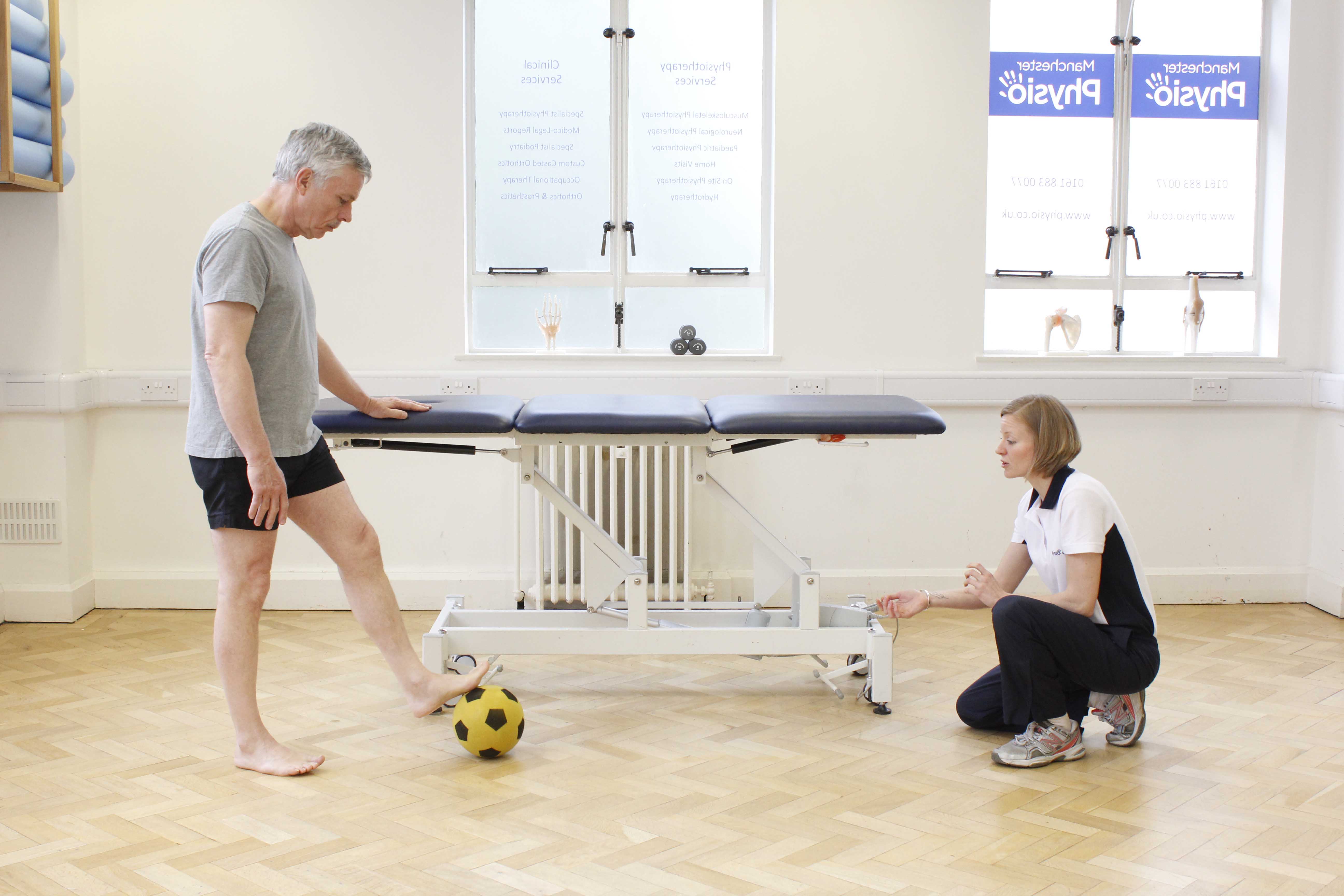What is a brain tumour?
A brain tumour is a growth of abnormal cells in the brain which damages or puts pressure on the brain. This disturbs brain function and can affect movement and cognition. A brain tumour can be primary or secondary in nature.
Primary tumours start in the brain and can be malignant or benign:
- Malignant brain tumours are made up of cancerous cells. These cells originate in the brain and can grow rapidly and may invade surrounding tissue and spread to other parts of the body through the blood and the lymph systems.
- Benign tumours are non cancerous cells and grow slower than malignant tumours.
A secondary brain tumour is the most common type of brain tumour whichbegins somewhere in the body and spreads to the brain.
Brain tumours differ in their type, their size, their rate of growth and their position in the brain.
 Above: Neurological physiotherapist supervising gross motor skill co-ordination exercises
Above: Neurological physiotherapist supervising gross motor skill co-ordination exercisesTypes of brain tumour
There are many different types of brain tumours depending on what kind of tissue they contain. The most common type of tumour is a glioma which maintains the nerve cells in the brain. Other types of brain tumour include meningioma, haemangioma and pituitary adenoma.
Diagnosis of a brain tumour
Your GP will take a detailed medical history and examination and may look into the back of your eye in order to make a diagnosis. If a brain tumour is suspected then you may be referred to a neurologist, neurosurgeon or an oncologist who will carry out scans of the brain. A biopsy will diagnose the type of brain tumour. This can be done by taking a small sample of tissue from the brain to find out exactly what type of tumour you have and if it is cancerous or benign.
What causes brain tumour?
Some brain tumours are present at birth due to abnormal development of the foetus. The cause of brain tumours not present from birth is not fully understood. The use of mobile phones, hair dye and hormones have been suggested to increase the risk of developing a brain tumour however more research is needed to confirm this.
Approximately 5% of brain tumours are thought to have a genetic cause.
Some people that have certain hereditary conditions such as Turcot syndrome, Li-Fraumeni cancer syndrome, and tuberous sclerosis have an increased risk of developing growths in the brain.
What are the effects / symptoms of brain tumour?
The effects of a brain tumour are varied and usually depend on the type of tumour, the size, and location in the brain. Growth of cells in the brain take up space, adding pressure and damaging tissue which can change the function of the brain. These changes may be temporary or permanent, depending on the cause.
A person with a brain tumour may experience:
- Lack of appetite
- Irritability, and fatigue
- Depression
- Severe, persistent headache
- Vomiting, which is sometimes sudden and for no apparent reason
- Dizziness
- Epilepsy
- Loss of muscle control
- Partial loss of vision or loss of hearing
- Erratic memory
- Personality changes
Physiotherapy for a brain tumour
At Physio.co.uk we understand that a person diagnosed with a brain tumour will feel anxious and this will affect notonly you but those close to you as well. It is important to seek treatment as physiotherapy will benefit a person with a brain tumour. Our motivated neurological physiotherapists will help you feel more in control by allowing you and your close ones to participate in decisions regarding your treatment plan and setting goals specific to your needs. Physiotherapy treatment will promote your independence by maximising your functional abilities as much as possible. Treatment sessions will focus on your symptoms and your goals by helping:
- Improve posture
- Promoting normal movement
- Improve balance
- Increase strength
- Prevention of muscle shortening
- Promotion of activities of daily living
- Improve safety
- Increase energy levels
- Improve sense of well being
- Reduce pain and muscle spasms
- Promotion of independence
- Improve quality of life
- Muscle strength training to reduce muscle weakness
- Muscle stretching to help lengthen tight muscles and reduce stiffness
- Exercises to build stamina and reduce fatigue
- Correcting and varying position to improve balance and coordination
- Teaching transfers (getting in and out of a wheelchair, bed, car, shower/bath and onto and off a toilet)
- Orthotic devices and walking aids to encourage the foot to lift upwards when stepping and prevent injury
- Hydrotherapy treatment
- Functional Electrical Stimulation (FES) to stimulate the nerve supplying the leg and help lift the foot upwards to improve the quality of walking

 0330 088 7800
0330 088 7800

































